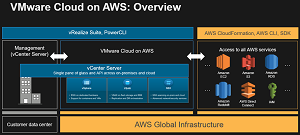News
How Will AWS Answer IBM/Red Hat Hybrid Challenge?
The computing service provider cloudscape was rocked by last Sunday's news that IBM was acquiring Red Hat to create a challenge to dominant leader Amazon Web Services Inc. (AWS) in the hybrid space.
In a news release saying the move is "completely changing the cloud landscape," Ginni Rometty, IBM chairman, president and CEO said, "The acquisition of Red Hat is a game-changer. It changes everything about the cloud market. IBM will become the world's #1 hybrid cloud provider, offering companies the only open cloud solution that will unlock the full value of the cloud for their businesses."
Furthermore, in a press/analyst conference call, Arvind Krishna, IBM's SVP of Hybrid Cloud, reiterated that the acquisition will make his company the world's leading hybrid cloud provider. IBM's goal, he said, "is to win in hybrid cloud, and win on the basis of open technologies, and in the end to provide a technology that makes life easier [for companies] with less complexity and a future proof investment."
Red Hat exec Paul Cormier weighed in on the same conference call: "Our customers are seeing open hybrid cloud as the only way to bring public cloud into their IT infrastructure, and because of our size we can't recognized the potential of that demand," he was quoted as saying in an article on sister publication ADTMag, written by John K. Waters. "IBM helps us bring that strategy to 170 countries and accelerates our vision into the market."
While AWS has long ruled every segment of the computing cloudscape, the hybrid arena -- where on-premises implementations are mixed with public or private cloud platforms -- may be the cloud giant's weak spot.
For example, even some three years ago the commonly cited No. 2 horse in the race, Microsoft Azure, claimed an edge in hybrid. When Mike Schutz, general manager of cloud platform marketing at Microsoft, was asked how Microsoft differentiates Azure from AWS in a presentation at the Deutsche Bank 2015 Technology Conference, he replied Azure had an edge in the number of regions with a Microsoft presence, and followed that up with:
"That's one of the fundamental tenets, but AWS is big, too, and so the other elements -- and this is where really the differentiation comes in -- is around hybrid, because of our fundamental strategy to help customers deploy the same technologies that we put in our public cloud hyperscale datacenter and run those in their datacenter on top of Hyper-V, on top of our System Center assets, as well as bringing Azure [Infrastructure as a Service] and Platform as a Service capabilities to run in their datacenters."
Other hybrid challenges have also been mounted, such as a Google/Cisco partnership last year of which we reported: "Cisco's HyperFlex HX-Series systems will enable hybrid workloads to run on-premises and in GCP. The hybrid GCP offering is based on Kubernetes, the open source container orchestration and management platform that provides lifecycle management, support for hybrid workloads and policy management."
Now, with IBM arming itself with Red Hat hybrid cloud infrastructure, AWS will be fending off another challenger.
Sometimes AWS seems to emphasize its public cloud services over hybrid, with recent best practices guidance on hybrid cloud customer use cases characterizing hybrid as a step in a journey: "Operating in a hybrid architecture is a step in the cloud adoption journey for many organizations that have on-premises technology investments."
 [Click on image for larger view.] The AWS Hybrid Solution (source: AWS video).
[Click on image for larger view.] The AWS Hybrid Solution (source: AWS video).
So, with the new challenge from IBM, what does AWS have in response? The answer lies here: Hybrid Cloud Architectures with AWS:
"For most organizations with on-premises technology investments, operating in a hybrid architecture is a necessary part of cloud adoption," the site states. "Migrating legacy IT systems takes time. Therefore, selecting a cloud provider who can help you implement a thoughtful hybrid strategy, without requiring costly new investments in on-premises hardware and software, is important to simplify operations and more easily achieve your business goals.
"By working closely with enterprises, AWS has developed the industry’s broadest set of hybrid capabilities across storage, networking, security, application deployment, and management tools to make it easy for you to integrate the cloud as a seamless and secure extension of your existing investments."
AWS also cites numerous partners it has teamed up with in the hybrid space, including Intel, Microsoft, SAP and VMware.
 [Click on image for larger view.] VMware on AWS (source: AWS).
[Click on image for larger view.] VMware on AWS (source: AWS).
Among those, VMware is front and center. For example, last November, AWS and VMware announced updates to their hybrid cloud offering that went live several months earlier. The updates covered: billing and regional availability; data and application protection; application migration; and scalability.
More recently, at the 2018 VMworld conference, the virtualization specialist announced several more enhancements to its VMware Cloud on AWS hybrid offering.
Prominent among the enhancements was this: "With VMware NSX Hybrid Connect (previously known as VMware Hybrid Cloud Extension) powered by vMotion and vSphere Replication, customers will be able to live migrate thousands of VMs with zero downtime. VMware is offering a free migration cost assessment with VMware Cost Insight to assist with cloud migration planning."
So, going forward, AWS might expand on its aforementioned partnerships with on-premises providers such as Intel and SAP, if not Microsoft, the other "partner" listed by AWS.
With the $34 billion IBM/Red Hat deal mounting a new challenge, more and extended partnerships coming from AWS may well be the key to success in its effort to retain overall cloud supremacy.
About the Author
David Ramel is an editor and writer at Converge 360.